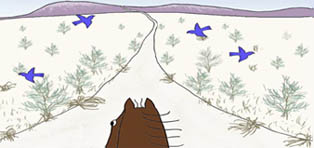Outsideonline.com - Full Article
Should we continue blazing trails into wild places? Kenneth Brower doesn't think so.
By: Kenneth Brower
Aug 12, 2016
ne months before the discovery of the largest oil field in North America at Prudhoe Bay in Alaska, the executive director of the Sierra Club sent a team of three of us north to Alaska, on a premonition. It was clear by then, summer of 1967, that a big strike on the North Slope was likely. Our assignment was to gather materials for a large-format photographic book defending the nation’s last great wilderness against Big Oil.
I was 22, the writer. My two photographer companions and I flew in by bush plane to Last Lake on the Sheenjek River, then walked for five weeks across the Brooks Range and out to the Arctic Ocean.
Near the shore of Last Lake, before we departed, I found the cache of a native Alaskan Gwich’in hunter, a tiny shake cabin elevated atop peeled spruce poles. No wolverine or grizzly had figured how to climb the poles. The door remained intact. Inside I found the hunter's draft card; his name was Ambrose William. We left William's cache behind us and walked north in perpetual daylight for more than a month without seeing another sign of human being—not a blaze on a tree, not a corroded tin can, not a dropped penny, nothing. We had entered a perfect traillessness.
In our photo book on the Brooks Range, and in a follow-up book I co-authored on the Trans Alaska Pipeline southward from Prudhoe Bay, we laid out all the threats: disruption of caribou migration by the pipe; the thawing of permafrost underneath it; the slow biodegradation of any leaks, marine or terrestrial; the seismic terrain traversed; the narrow waterways that supertankers would have to negotiate with Prudhoe oil. (We predicted the wreck of the Exxon Valdez 15 years before that ship was built.) But nothing about the pipeline itself worried us, and other environmentalists, more than did the service roads for pipeline maintenance. There is nothing more fatal to wilderness than a road. Roads open up the country to vehicles, prospectors, recreational hunters, the occasional arsonist. Roads have “edge effects” from which wilderness unravels to either side. The trail is a primitive road on a much smaller scale, but with similar dynamics...
Read more here:
http://www.outsideonline.com/2105181/great-trail-debate-we-dont-need-any-more-trails?utm_source=dispatch&utm_medium=newsletter&utm_campaign=08232016&spMailingID=26315294&spUserID=MjY1ODQxODc4MTkzS0&spJobID=864088160&spReportId=ODY0MDg4MTYwS0

No comments:
Post a Comment